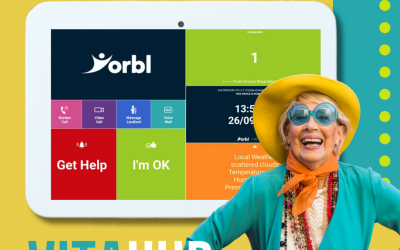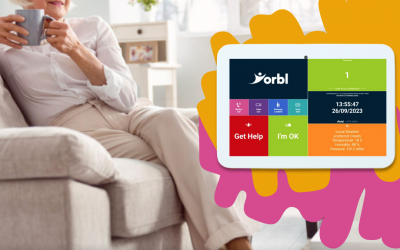The lack of acknowledgment of the Welsh language by Google’s voice recognition technology has been a stumbling block for many companies and platforms that rely on natural language processing. One such example is Yorbl, a social alarm platform that helps elderly people to stay connected and independent.
As well as having an easy to use Graphical User Interface (GUI) that is switchable between a growing number of languages, Yorbl’s social alarm platform is also designed to understand and respond to natural language queries and commands, allowing users to interact with the system using voice commands. However, although Yorbl already offers a range of languages for Voice Control, the platform is unable to support Welsh language users due to the fact that Google’s voice recognition is surprisingly yet to recognise the Welsh language.
This has been a frustrating experience for Yorbl’s team and Welsh language advocates, who recognize the importance of linguistic diversity and inclusivity in technology. The exclusion of Welsh from Google’s voice recognition technology not only limits the reach of Yorbl’s platform but also sends a message that minority languages are not valued in the technology industry.
Furthermore, the Welsh Language Act 1993 is a piece of legislation that sets out to establish the Welsh language as an equal partner with the English language in Wales. The main principles of the Act include:
- The Welsh language should be treated no less favourably than the English language. This means that Welsh speakers should not be discriminated against or disadvantaged because of their language.
- Public bodies in Wales must prepare and implement Welsh language schemes to set out how they will provide services in Welsh, where appropriate. This includes local authorities, health boards, and other public bodies.
- The Act establishes the Welsh Language Board, which is responsible for promoting and facilitating the use of the Welsh language, and monitoring compliance with the Act.
- The Act also provides for the right of Welsh speakers to use Welsh in legal proceedings, including in court.
- The Welsh Language Commissioner was created by the Welsh Language (Wales) Measure 2011 to regulate the Welsh language standards that public bodies must comply with.
These principles have been further expanded upon by later legislation, such as the Welsh Language (Wales) Measure 2011 and the Welsh Language (Wales) Act 2019, which aim to strengthen the legal framework around the Welsh language in Wales. It highlights the broader issue of a lack of investment in minority language technology. While Welsh may not be as widely spoken as some other languages, it is still an official language of the United Kingdom and its exclusion from voice recognition technology is an example of a broader trend of neglect of minority languages.
Peter Reed-Forrester, Yorbl’s CEO stated that “Inclusivity is a core part of Yorbl’s ethos and the ability to provide our solutions to anyone in any language has always been a core objective. Frankly, I am astounded that Google have failed to provide Welsh language recognition. I sincerely hope they rectify this error ASAP.”
Richard Gate, Lead Developer at Yorbl Technologies, commented on Google’s technology, “We have been faced with many challenges in the development of natural language processing, supporting Welsh language users and the implications of this exclusion. Let’s hope that that more developers and companies will recognize the importance of linguistic diversity and steer Google towards building more inclusive technology.”
National Programme Manager for TEC (Technology Enabled Care) Cymru, AARON EDWARDS, agrees with the situation; “The lack of recognition of Welsh by Google’s voice recognition technology is a significant obstacle for companies like Yorbl Technologies that rely on natural language processing. It highlights the importance of linguistic diversity and the need for more investment in minority language technology. We urge companies like Google to recognise the value of minority languages and to work towards inclusivity in all their technology.”





0 Comments